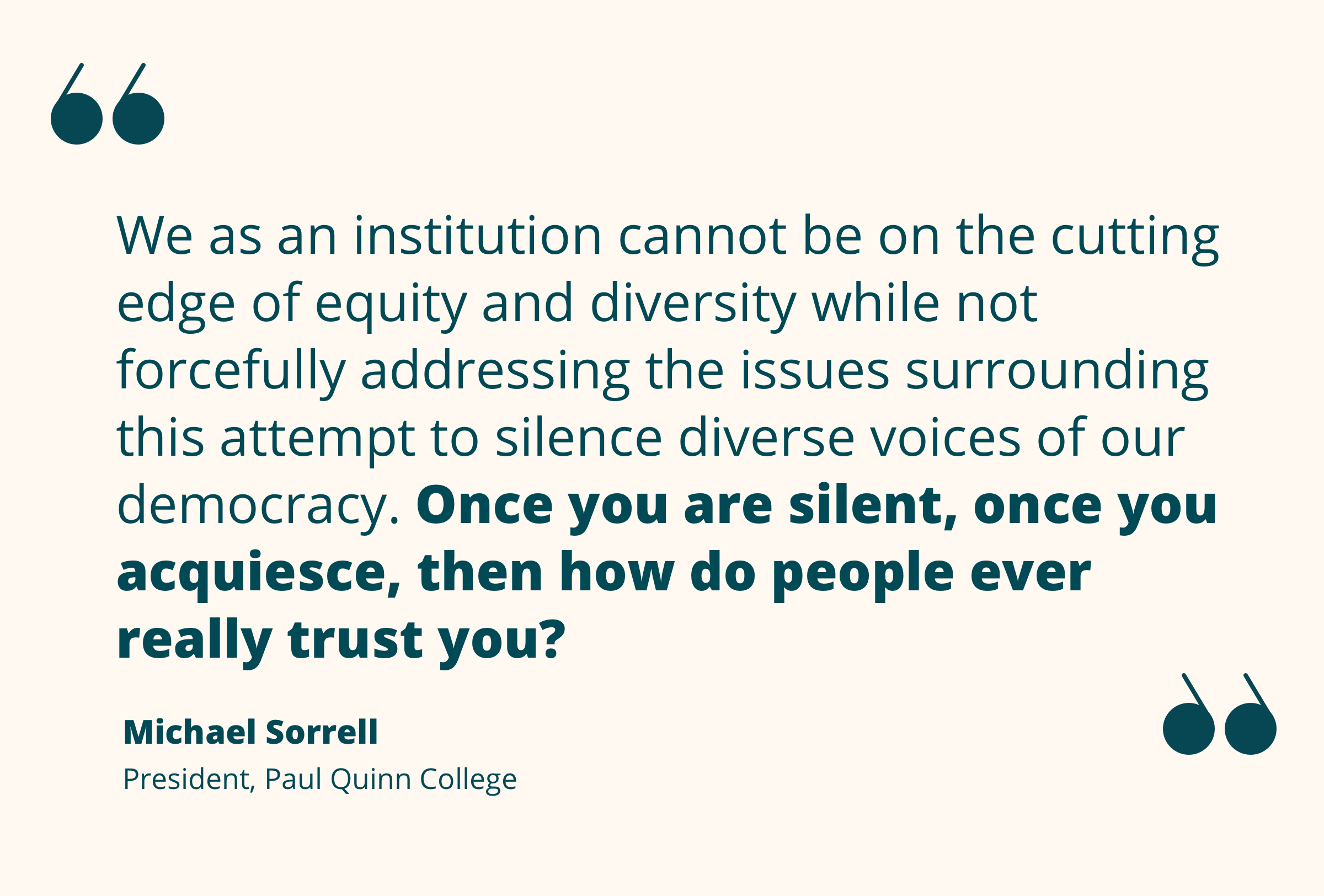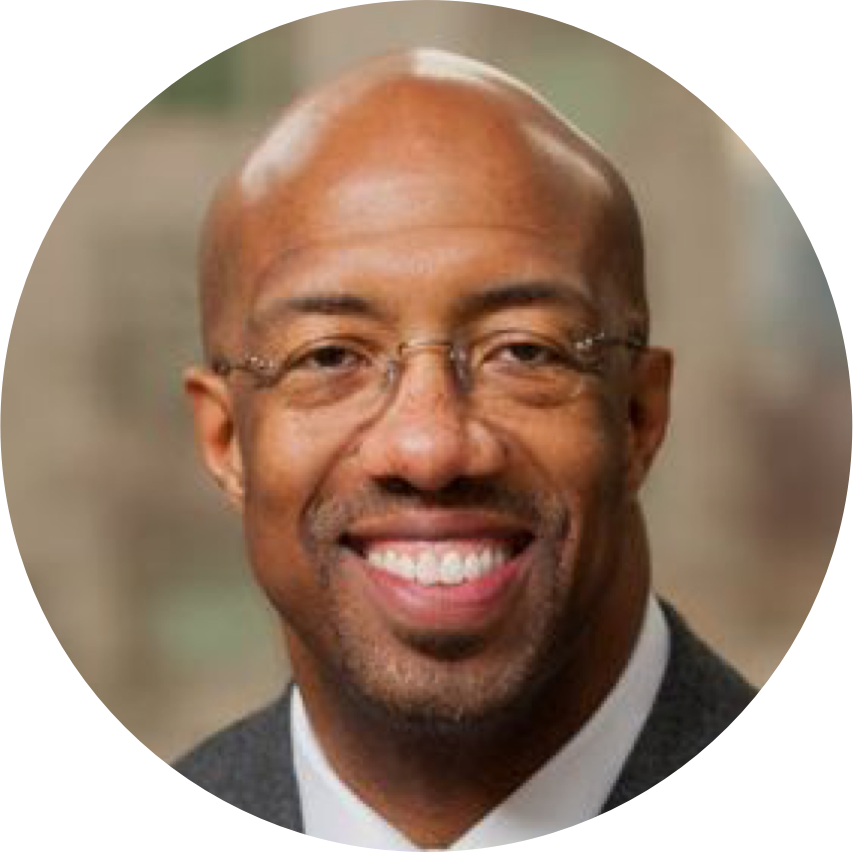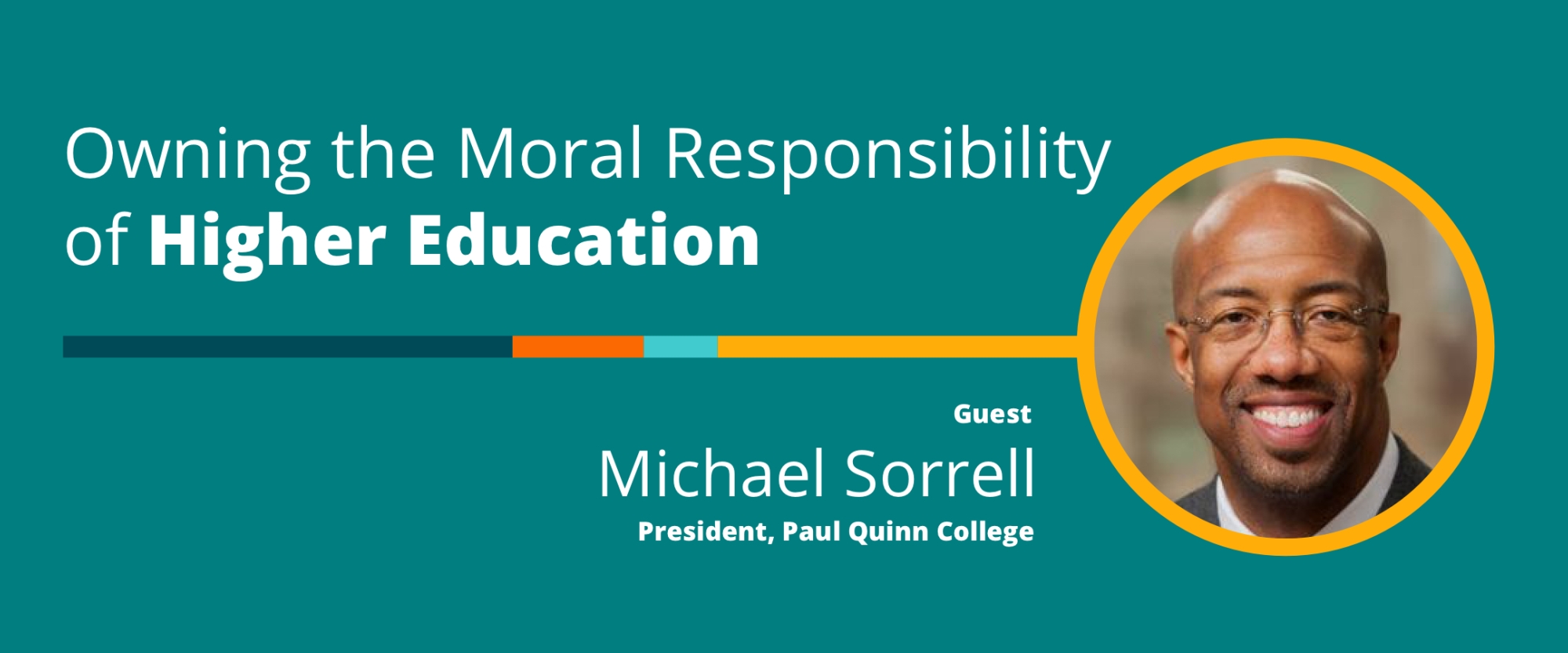Note: This interview in the Weekly Wisdom Series originally aired on February 22, 2021 as part of the University Innovation Alliance’s Innovating Together podcast, appearing live on Facebook, Twitter, and LinkedIn.
The University Innovation Alliance (UIA) is excited to present the Innovating Together Podcast, created in collaboration with Inside Higher Ed. I'm the UIA's Executive Director and my co-host is Doug Lederman, Editor and Co-Founder of Inside Higher Ed. For the 2/22/21 episode of Innovating Together's Weekly Wisdom series, we spoke with Dr. Michael Sorrell, President of Paul Quinn College in Dallas, Texas. This was something of a follow-up conversation with President Sorrell, and we were eager to hear his most recent wisdom about leading a Historically Black College or University (H.B.C.U.) through a turbulent year marked by the COVID-19 pandemic and a national protest movement against institutional racism.
The Human Face of Leadership
We asked President Sorrell about whether his leadership has evolved since we last spoke to him in April 2020, just one month into the pandemic.
"I don't know anyone that fully was ready to understand the emotional toll of nine and ten months of managing in a pandemic," he admitted. "I felt that I was personally prepared." But then the sprint turned into a marathon. "By the time we got to November and December, I was emotionally exhausted. I was physically tired. I was appreciative, maybe more so than ever before, to have the Christmas break. But now I'm back, fired up, ready to go, and guns blazing.
"I have been candid with my staff," he went on. "I told them, 'Listen, you didn't get the A-plus leadership model of me that you have come to expect. And let me tell you why. And let me tell you how that has impacted me and impacted us.' I found that my candor resonated, because as a leader you still have to be human, and you're modeling for people what some of them may aspire to become. So I wanted to show that once you get through your season, you've got to turn it back up. And you know, I think my staff would tell you, the A-plus version has returned with a tenacity and a fervor that maybe some of them wish I was back to my A-minus version of myself."
Finding Optimism Amidst Adversity
President Sorrell has been painfully aware that students from under-represented minority groups and other disadvantaged students haven't fared well during the pandemic.
"Let's talk about why students from under-represented and under-resourced communities seem to be opting out of higher education at this moment," he said. "It isn't that these individuals are no longer interested in higher education. It isn't that they aren't capable of balancing the work for economic resources and the work for their studies. It's not because they aren't good enough, strong enough, qualified, or capable. It has everything to do with the fact that they're exhausted." He mentioned that fall semester saw 90% of Paul Quinn College students simultaneously working at wage-earning jobs at least 40 hours a week, adding, "It turns out that 42% of those students did not return to school this semester. Because it's too much. So now, we're spending a tremendous amount of time engaging those students, keeping them encouraged so that they know that they can come back, that this isn't always going to last."
He illustrated the importance of carefully crafting that message with a reference to the Stockdale Paradox as described in Jim Collins' Good to Great. Admiral James Stockdale, a P.O.W. for seven years during the Vietnam War, retained his optimistic outlook while simultaneously managing expectations in a high-stress situation over which he had no control. So unlike other schools that promised more than they could deliver, Paul Quinn College stayed positive while acknowledging the reality of the pandemic.
"We didn't make a big announcement about what we're doing in the spring," said President Sorrell, "because in the fall, we articulated a set of standards that would need to take place for us to feel comfortable bringing people back to campus. There needs to be widespread testing, and there needs to be a vaccine. When it is readily available, we will bring everyone back to campus." In the meantime, they're constructing new campus buildings and adding two new high schools in Dallas. "When our students return," he stated, "they'll be returning to a different, stronger place."
The Moral Role of Higher Ed
The turbulence of 2020 was amplified by national protest after the death of George Floyd, and President Sorrell spoke out about the response of higher ed to racist attitudes and practices. We invited him to summarize his position.
"In life, you learn you cannot serve two masters," he began. "We as an institution cannot be on the cutting edge of equity and diversity while not forcefully addressing the issues surrounding white supremacy and white nationalism, and this attempt to silence diverse voices of our democracy. Once you are silent, once you acquiesce, then how do people ever really trust you?

"One night, I spoke as part of a panel on a conversation around ethics that was sponsored by the Holocaust Museum here in Dallas," he recalled. "And I came down pretty aggressively against people in our community who somehow had made the ethical compromise of living with these Trumpian decisions and declarations and practices that included blatantly racist acts. I talked about how when you don't speak up against that, that you are enabling them. And someone that I used to practice law with sent me this long email after the event about all the wonderful community service projects that he and his wife do and the money that they give. He was personally offended and hurt by my stance. And I told him I was personally offended and hurt by his support of a candidate who very clearly was anti- my very person, and that made fun of the disabled, and disrespected women. And I said, 'I don’t understand what justification you can have for supporting people who very clearly have made ethical and moral compromises.'
"We have to understand that there will be another season of people who try and force these ideas into our public consciousness," President Sorrell warned. "They will still be racist and sexist, and as higher ed, we have to ask ourselves, when does our bell toll? At what point do we acknowledge our role in the moral development of our country in terms of what democracy will look like? Because you cannot promote and create entire offices of your college around diversity and inclusion and then not stand up for diversity and inclusion because it's inconvenient for you to do so. We have to make a decision around that. Who are we going to be? And for whom are we going to be that?"
The A-Plus Version
President Sorrell reminded us that his mission at Paul Quinn is his response to that moral choice.
"Every single semester, you're going to be pushed past the point that you thought you were capable of performing," he acknowledged. "There are going to be days where you feel as if you're pushing the boulder up the hill. But think about how the mother or father who come home and the lights don't work, and they don't know how they're going to feed their children, and they're living with the constant inability to do simple things simply; we don’t have the luxury of not performing for those people. So if we are blessed to have the opportunity to make a difference in their lives, then we damn better show up at the highest level we can every day. Because it is an honor to serve. I think that there's a place in our society for really mission-driven opportunities where people engage because it's what their heart tells them to do."
Links Mentioned in This Episode
• Paul Quinn College
• H.B.C.U. (Historically Black College or University)
• Good to Great: Why Some Companies Make the Leap and Others Don't by Jim Collins
• Death of George Floyd (as reported in Time magazine)
• a conversation around ethics (Funk Family Upstander Speaker Series, 11/13/20)
Bios of Guest and Co-Hosts

Guest: Michael Sorrell, President, Paul Quinn College
Dr. Michael J. Sorrell is the longest-serving President in the 148-year history of Paul Quinn College. During his 13 years of leadership, Paul Quinn has become a national movement for its efforts to remake higher education in order to serve the needs of under-resourced students and communities. In that time, Paul Quinn won HBCU of the Year among other awards, created the New Urban College Model, and achieved full-accreditation from the Transnational Association of Christian Colleges and Schools (TRACS). As one of the most decorated college presidents in America, President Sorrell was named Higher Education’s President of the Year by Education Dive, one of the World’s 50 Greatest Leaders by Fortune Magazine, and one of the “31 People Changing the South” by Time Magazine. President Sorrell B.A. in Government from Oberlin College, his J.D. and M.A. in Public Policy from Duke University, and his Ed.D. from the University of Pennsylvania. While in law school, he was a founding member of the Journal of Gender Law & Policy and served as the Vice President of the Duke Bar Association. A Sloan Foundation Graduate Fellowship funded his studies at both Harvard University’s Kennedy School of Government and Duke University. President Sorrell serves as a trustee or director for Duke University’s School of Law, the Graduate School of Education at the University of Pennsylvania, JP Morgan Chase’s Advancing Black Pathways, Amegy Bank, the Hockaday School, the Dallas Advisory Board of Teach for America, the Dallas Foundation, and EarthX, among others.

Co-Host: Bridget Burns, Executive Director, University Innovation Alliance
Dr. Bridget Burns is the founding Executive Director of the University Innovation Alliance (UIA). For the past decade, she has advised university presidents, system chancellors, and state and federal policy leaders on strategies to expand access to higher education, address costs, and promote completion for students of all backgrounds. The UIA was developed during Bridget’s tenure as an American Council on Education (ACE) Fellowship at Arizona State University. She held multiple roles within the Oregon University System, including serving as Chief of Staff and Senior Policy Advisor, where she won the national award for innovation in higher education government relations. She was a National Associate for the National Center for Public Policy and Higher Education, and has served on several statewide governing boards including ones governing higher education institutions, financial aid policy, and policy areas impacting children and families.

Co-Host: Doug Lederman, Editor and Co-Founder, Inside Higher Ed
Doug Lederman is editor and co-founder of Inside Higher Ed. With Scott Jaschik, he leads the site's editorial operations, overseeing news content, opinion pieces, career advice, blogs and other features. Doug speaks widely about higher education, including on C-Span and National Public Radio and at meetings and on campuses around the country. His work has appeared in The New York Times and USA Today, among other publications. Doug was managing editor of The Chronicle of Higher Education from 1999 to 2003, after working at The Chronicle since 1986 in a variety of roles. He has won three National Awards for Education Reporting from the Education Writers Association, including one for a 2009 series of Inside Higher Ed articles on college rankings. He began his career as a news clerk at The New York Times. He grew up in Shaker Heights, Ohio, and graduated in 1984 from Princeton University. Doug and his wife, Kate Scharff, live in Bethesda, MD.
About Weekly Wisdom
Weekly Wisdom is an event series that happens live on Facebook, Twitter, and LinkedIn. It also becomes a podcast episode. Every week, we join forces with Inside Higher Ed and talk with a sitting college president or chancellor about how they're specifically navigating the challenges of this moment. These conversations will be filled with practicable things you can do right now by unpacking how and why college leaders are making decisions within higher education. Hopefully, these episodes will also leave you with a sense of optimism and a bit of inspiration.
Rate, Review & Subscribe
Learn why hundreds of people have rated this new podcast 5 stars! Please join others and rate and review this podcast. This helps us reach and inform more people -- like you -- to help increase the number and diversity of college graduates in the United States.
Click here, scroll to the bottom, tap to rate with five stars, and select “Write a Review.” Then be sure to let us know what you loved most about the episode! Also, if you haven’t done so already, subscribe to the podcast. We’ll be adding a bunch of bonus episodes to the feed and, if you’re not subscribed, there’s a good chance you’ll miss out.

